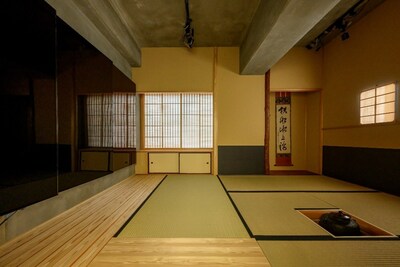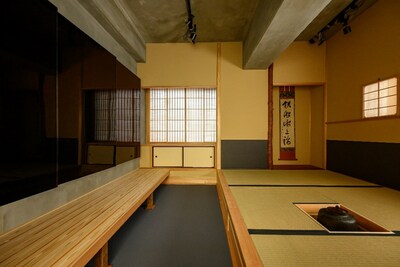Empirical Research to Explore the Developmental Potential of Chanoyu Culture Begins
02/27/2023
Introducing Jakuin, a tea room combining sukiya architecture philosophy and techniques with digital technology
TOKYO, Feb. 27, 2023 /PRNewswire/ -- Sony Computer Science Laboratories, Inc.'s (hereinafter referred to as Sony CSL) Kyoto Laboratory (Director: Jun Rekimoto), and Millieme Co., Ltd.'s Sabié Cultural Institute (President: Reijiro Izumi) will begin empirical research to the developmental potential of chanoyu (tea ceremony) culture. As a practical venue for the research, the tea room Jakuin – supervised by Sabié Cultural Institute – will open in the Sony CSL Kyoto Laboratory by combining sukiya architecture philosophy and techniques with digital technology.
Sony CSL uses its Kyoto Laboratory, which opened in 2020, to conduct research focused on the fulfillment of human values, and is exploring avenues for developing new technologies that benefit all people. The Sabié Cultural Institute, which was founded in 1992 by Masakazu Izumi, second son of Hounsai, the 15th Iemoto (tea Grand Master) of Urasenke, also resumed its operations in 2022 and carries out research and practical applications aimed at sustainable development of chanoyu culture via the passing on of chanoyu tradition and seeking the quintessential nature of this culture.
The recently opened tea room Jakuin is a practical venue for ongoing joint empirical research of digital technology with a view to an evolutionary future for chanoyu culture, an unprecedented new approach to this field. The two organizations seek to work together to contribute to cultural development and give back to modern society by building Jakuin that respects the essence and spirituality of chanoyu culture and creating new experiences, while incorporating various technologies researched and developed by Sony CSL, including human augmentation technology*.
* Technology that becomes one with human beings and expands their capabilities. [https://www.sonycsl.co.jp/news/4037/]
* The name Jakuin comes from "JackIn," a research theme spearheaded by Jun Rekimoto
[https://www.sonycsl.co.jp/tag/jackin/]
The main research and development themes incorporated in Jakuin at the time of this release are described below. Research results will be returned to real space using modern IT, and joint research will be aimed at making cultural contributions that resolve issues that arise from new experiences inside this space from a new perspective.
Passing Down Manners with Augmentation, by JackIn Space
* A collaboration with Social Cooperation Program of The University of Tokyo and Toppan Printing Co., Ltd.
Tea ceremony training is a learning process that involves physicality. One acquires the traditional manners that have been handed down from generation to generation through master-disciple teaching. In this research theme, real-time acquisition of point cloud data from the 3D space inside the tea ceremony room enables the user to confirm from a free viewpoint such things as a person's movements and the arrangement of utensils, and to check not only the tea ceremony instructor's movements and personal manner but also the users own movements as a ghost,
thereby aiding in the handing down of these traditional manners.
3D Chakaiki (tea ceremony record) by NeARportation
Chakaiki is the Japanese term for a record based on the experience of being at a tea ceremony, including the utensils used and the food served, and is an important part of the history of a chanoyu culture that has been forged over a period of 490 years. This research theme suggests the creation of a 3D form of the Chakaiki, which traditionally has been recorded in text form, using a 3D reproduction method for the various textures of tea utensils and tea confectioneries.
Yukimi Door by Squama Yukimi
The path to the tea room needs to be both "open" (to show guests the route to it) and "closed" (to cut it off from the everyday world outside); slightly open sliding doors and sekimori-ishi (barrier stones) placed outside have played these roles. In this research theme, a programmable shoji door with partially adjustable transparency is built as the device to play these roles in the limited space of a tea room inside an office. By opening the view just enough so that visitors can see what is going on inside as they enter the room, and closing off the field of vision once they are inside the room, these opposing open and closed requirements are met with a single door.
* JackIn is a registered trademark of Sony Group Corporation.
* 茶美会 and SABIE are registered trademarks of Millieme Co.,Ltd.
Remarks by Jun Rekimoto, Deputy Director, Sony CSL /Director of Kyoto Laboratory
In an age when we can use IT to instantly connect us to the world from anywhere, the value of the real world, which only exists in the here and now, will be reaffirmed. Meanwhile, the tea ceremony room is simultaneously a carefully thought-out real space and a reconstruction of reality that gives the appearance of a mountain dwelling in the middle of a city. Our research activities going forward will be driven by our belief that integrating the real and the virtual with a sophisticated aesthetic sensibility and developing technology and culture while allowing them to stimulate each other will lead to our future well-being.
Remarks by Reijiro Izumi, President, Sabié Cultural Institute, Millieme Co., Ltd.
Having been born into the Izumi family, a branch of Urasenke, I've done what little I can do to pass on the traditions of chanoyu culture. Difficulties are expected in the environment surrounding this culture, which has unfolded over the past roughly 500 years, and I feel it is important to have a vision for its future development. We believe that the existence of Jakuin and our joint research will serve as a solid model case for the future of chanoyu culture.
SOURCE Sony Computer Science Laboratories, Inc.

For further information: Corporate Communications, Sony Computer Science Laboratories, Inc., csl-pr@csl.sony.co.jp; Media Relations, Sabié Cultural Institute, Millieme Co.,Ltd., contact@sabie.jp

